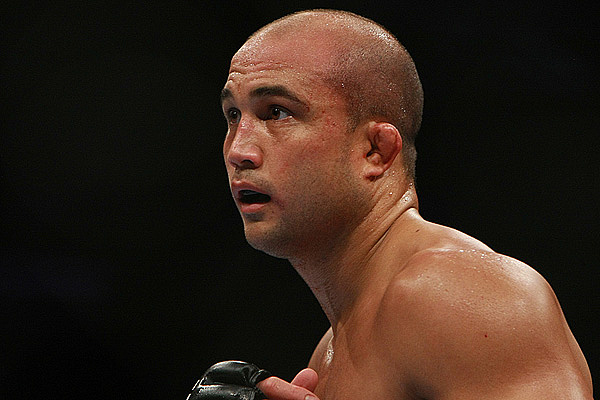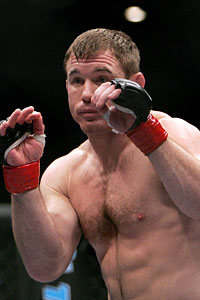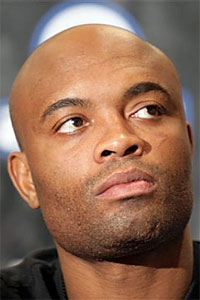UFC 112: What We Learned
Apr 10, 2010

File Photo: Sherdog.com
UFC 112 was supposed to be a game-changing show for the UFC. Setting up shop in the consumerist utopia known as Abu Dhabi was supposed to be a moneymaking match made in heaven for the UFC. Putting together a card headlined by two of the sport’s premier pound-for-pound luminaries was supposed to be the ultimate insurance policy against disaster.
Advertisement
Between the enigma known as Anderson Silva making a mockery of his chosen profession and B.J. Penn falling victim to one of the worst examples in fistic history of big fight judging, the ultimate insurance policy turned out to be about as useful as a sixth toe. Throw in local favorite Renzo Gracie sleepwalking through his fight with elder statesman Matt Hughes and all three of the bouts driving the UFC’s push into uncharted territory turned out to be nothing short of an embarrassment.
The good news is that the UFC has done a good job of learning from
failure in the past -- even while denying the failure’s existence
-- and the company just witnessed a master’s course in uncut,
unadulterated failure. Here is the cheat sheet for what every MMA
fan better hope the UFC learns from a night that will live in
infamy for them and anyone unfortunate enough to have plunked down
50 beans for this entertainment vortex.
Only the PGA Needs a Seniors Tour
Truly great fighters who have put in their fair share of pain and passion deserve a chance to say goodbye in a manner befitting their greatness. That sounds like a quaint notion, but the fact is that being a professional athlete is a rough gig and you’re only owed what your wits and fists can get you. Case in point is Matt Hughes, who would get eaten alive in the current UFC welterweight division, yet his faithful service to the UFC has him cashing checks for pointless fights no one wants to see.
It’s one thing to give Hughes a going-away fight, but he still has multiple fights left on his contract and there isn’t a chance he’ll be thrown to any of the division’s new guard. Meanwhile, on the same night, quality young welterweights Rick Story and Nick Osipczak were left to battle it out on the preliminary card in a bout of far greater significance than any Hughes will soon find himself in.
That is the real crime here: exciting prospects cannibalizing each other’s hype on the preliminary card just to hold out hope of someday making a pay-per-view show.
This isn’t about whether or not Hughes deserves a few dozen victory laps; it’s about whether or not his going-away tour is worth missing out on fights that are actually worth watching. Given the commitments the UFC has to faded stars like Hughes, Chuck Liddell, Randy Couture, Tito Ortiz and the like, it’s hard to envision a scenario where fans won’t end up having to sit through one victory lap too many.
It’s the Judging, Stupid
The judging of the lightweight title bout between former incumbent B.J. Penn and Frankie Edgar confirmed the worst fears of every fan paying close attention to the judging trends in MMA -- that it was a matter of time before substandard judging ruined a title bout. Bad judging decisions have become a fact of life in MMA, and nearly every UFC card has at least one judge striving to put together the most nonsensical approach to scoring possible.
The fact that all three judges scored the bout for Edgar was bad enough, but two of them saw it as a lopsided bout. A supposedly lopsided bout that Penn clearly won, at absolute worst, three rounds of by any objective measure. Full credit is due to Edgar for surviving a difficult first two rounds and occasionally landing some clean punches on Penn as the bout dragged on, but he simply did not deserve to win a judges’ decision.
Penn certainly fought a foolish fight by never testing Edgar’s ground game and generally presenting a stationary target for his hyperactive foe -- mistakes that made this fight more competitive than expected and paved the way for the judges to ruin his night. However, it doesn’t change the fact that Penn landed the cleaner punches while Edgar mostly bobbed around and whiffed on combinations. Plenty of ink and kilobytes have been wasted on the need for judging reform in MMA, but until it actually happens, every fight that heads to a decision will be an embarrassment in the making for all parties involved.
Deal with Anderson Silva
At the height of his brilliance, the preternaturally gifted pugilist Roy Jones Jr. was equal parts infuriating and spellbinding. Often content to prove his dominance by taunting and picking at frustrated opponents instead of displaying the once-in-a-generation combination of power and speed that his fans waited for with baited breath, Jones Jr. certainly didn’t make it easy for anyone to like him. UFC middleweight champion Anderson Silva seems hell-bent on walking the same line.
Right next to masterful deconstructions of former champions such as Rich Franklin and Forrest Griffin are not only uninspired but downright bizarre performances against Thales Leites and Patrick Cote that don’t even begin to cover the insanity that was Silva’s bout with Demian Maia at UFC 112. Trying to understand the mentality of a fistic genius like Silva is pointless. It’s best to make peace with the fact he’ll always be unreliable at best and downright infuriating at worst.
Making him the headliner of a massively important show is simply courting disaster, especially when you match him against a fighter capable of exploiting him in the one area he has appeared vulnerable in. There isn’t much else to say except that Silva’s in-cage schizophrenia will always be a liability and should be carefully considered against his ability to deliver a ballet of violence. In other words, be very careful about making him your star employee.
Go Big? Maybe Just Go Home
Turning the UFC into a global brand is an admirable goal, but one that comes rife with difficulties, as evidenced by the UFC’s recent ban from German television. We’re still talking about a sport struggling to get sanctioned in New York, yet Dana White seems especially obsessed with planting the UFC flag in every corner of the world. Given White’s honest reaction to what happened at UFC 112, it’s obvious that reality is making a rude intrusion into his rosy plans.
While the UFC isn’t going to fall apart tomorrow and Strikeforce is still run far too ineptly to present a legitimate threat to its dominance, maybe it’s time the UFC as a whole reconsider what they’re doing. There are only so many markets in the world with the large upper middle class it takes to sustain a UFC event, and while Abu Dhabi is theoretically a good match, it didn’t take long for the UFC’s new revenue stream to turn on the product.
The sport of MMA is entrenched throughout Western Europe thanks to a long history of fight sport and an ever-expanding network of quality gyms that made the UFC’s transition into that market a slam dunk. Contrast that with Abu Dhabi, which is basically a hedonistic getaway for the super-rich, and it’s obvious that the UFC is dealing with a customer base they’re not terribly familiar with. All accounts say that UFC 112 was a financial success, but the more important question is whether that success can be replicated on a consistent basis. Something tells me the army of frustrated lay fans who packed the Ferrari World Concert Arena isn’t counting down the days to the UFC’s return.
Related Articles









